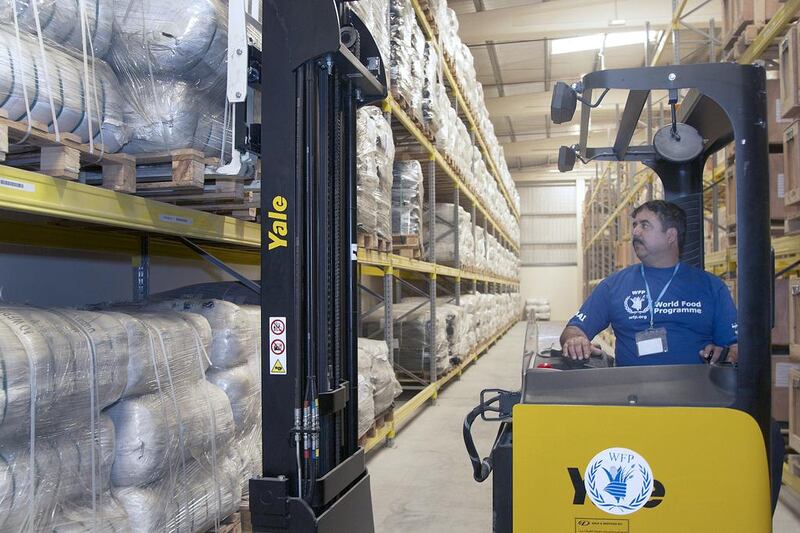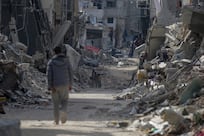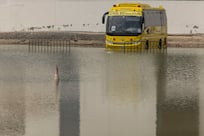These days the warehouses of the United Nations High Commissioner for Refugees in Dubai are busy with lorries being loaded with aid.
As conflicts rage in Iraq and Syria, they carry essential materials and food for the people displaced. But the lorries have also headed to the Central African Republic, South Sudan, Ethiopia, Myanmar, Vietnam, Jordan, Libya and Turkey this year where unrest and calamities have also displaced thousands of people.
The multibillion-dollar global humanitarian logistics industry coordinates the acquisition and delivery of services and supplies to crisis-stricken areas. In case of emergencies, such aid can include food, water, temporary shelter and medicine.
Around the world, aid agencies, suppliers and non governmental organisations work out of dedicated hubs to help them do this.
With Dubai’s strategic location in the Middle East, the humanitarian logistics sector and with it the International Humanitarian City (IHC) have rapidly expanded. With more than 50 members now, IHC has seen a growing demand for its office and warehouse space. As unrest continues in Syria, Iraq and Ukraine, aid agencies, suppliers and the aid supply routes from Dubai can only expect to get busier in the next few months and with that the demand for space at IHC will grow, too.
United Nations High Commissioner for Refugees (UNHCR) has its largest stockpile of core relief items at IHC, designed to serve 350,000 people, says Soliman Daud, a senior global supply officer for UNHCR.
The agency keeps blankets, mosquito nets and solar lamps among numerous other items at its Dubai warehouse.
“Dubai has a good strategic location and between 2007 and 2013 our stockpile has been increasing,” Mr Daud says. “By air, relief items can be dispatched in 72 hours.”
Supplies also move out by ship and on lorries. It takes six days to reach the camps in Amman in Jordan, for instance.
The humanitarian aid industry collected a record $22bn from donor governments, foundations, corporations and individuals, providing 250,000 jobs, last year, according to Ozlem Ergun, the Coca Cola associate professor and the co-director of Centre for Health and Humanitarian Logistics at Atlanta’s Georgia Institute of Technology.
Logistics costs depend to a large extent on the size of the organisation. But for large ones, such as UN World Food Programme, logistics makes up to three quarters of their operational expense, Ms Ergun says.
“Due to its strategic location and proximity to many disaster-prone areas in Asia and Africa and the Middle East [Dubai’s IHC] is one of the locations where most aid is stockpiled at,” she says.
“Such a hub brings a lot of related activity, such as the use of ports, airports, other logistics and transport services, and employment opportunities for the locals; so there is a contribution to the economy but I don’t know if at the bottom line it is profitable in the long term.”
UN Humanitarian Response Depot hubs are located in Ghana, Malaysia, Panama, Italy and Spain as well as Dubai. Most other such organisations also have regional hubs in these locations.
Operated as a non-profit free zone, the Dubai government-funded IHC houses nine United Nations agencies, 13 suppliers such as tent makers and food suppliers, and 28 international NGOs.
Among its members, UNHCR is the largest of all, closely followed by International Federation of Red Cross and Red Crescent Societies. Some other global agencies such as the UN Development Programme, Unicef and International Medical Corps have liaison offices there. The IHC members stock food, vehicles, water purifiers, tents, communications equipment and medicines among other items.
The IHC moved to its current sprawling facility in the desert near Al Maktoum International Airport from its smaller location in Business Bay in 2012 to double its space to store supplies. It did not have any warehouses in the previous location.
“We had planned for five years but now we are almost full,” says Shaima Al Zarooni, IHC’s chief executive. About 85 per cent of its office space is occupied while 95 per cent of its warehouse space is taken up.
It is expanding by adding 2,000 square metres to the existing office building next year. In the next three to five years IHC is planning to expand into two plots at Al Maktoum airport to provide additional office and warehouse space.
Despite being almost full, Ms Al Zarooni says IHC is conservative in terms of space expansion.
That said, IHC screens the aid agencies it lets into its premises.
“They have to be non-profit, non-political and non-religious,” Ms Al Zarooni says. “This is to ensure sustainability and build an institution.”
The agencies have to submit business plans, funding sources and number of employees among other details that are then reviewed by committee.
The process has been developed as demand for space from agencies increased.
Every year, IHC gets anywhere between 25 and 50 applications, and many do not meet the required criteria. “You have to have a physical presence here [to qualify],” Ms Al Zarooni says.
The UN agencies get offices and warehouse space free of charge as they have the largest operations and the NGOs get these at half the market prices, subsidised by the Dubai Government, she says. About 18 per cent of the total number of the members at IHC do not pay for sapce, at a cost to the IHC of Dh144 million since 2009. Bills footed by IHC for the paying members amount to Dh4.29m in that time.
Established in 2003, in 2005 the IHC received Dh37 million from Sheikh Mohammed bin Rashid, Vice President of the UAE and Ruler of Dubai, and private Dubai corporate sources.
Besides subsidised spaces, IHC offers other benefits in kind such as reducing paperwork involved in working with UAE Government agencies and preferential rates for airlines and hotels among other cost reductions for personnel.
“We want to make sure a trust is built,” Ms Al Zarooni says. “And we are making sure there is no bureaucracy.”
While logistics is still the main focus of the agencies at the center, there is a trend towards support services such an UNDP who run liaison offices.
The Food Banking Regional Network, which started as an NGO last year at IHC, coordinates memberships and fundraising from its Dubai office. The network has 12 food banks in the region,including Egypt, Lebanon and Tunisia
It raised Dh600,000 in the financial year ending May this year, says Rasha Nafea, a spokeswoman for the agency.
It aims to develop 15 more food banks in the region, including in South Sudan, Yemen and Libya.
As of now, the agencies are making the most of the facilities at hand.
On August 23, in an emergency response to the Iraq crisis, UNHCR shipped 16 containers loaded with 10,000 kitchen sets, 40,000 metres of blankets and 25,000 jerry cans valued at US$531,300 from the Jebel Ali port.
From Dubai, the aid travels to Bandar Abbas, Iran, from where the shipment is transferred to Erbil by road. It is due to reach the distribution centres in Erbil this week.
Iraq crisis, UNHCR shipped 16 containers loaded with 10,000 kitchen sets, 40,000 metres of blankets and 25,000 jerry cans valued at US$531,300 from the Jebel Ali port.
From Dubai, the aid travels to Bandar Abbas, Iran, from where the shipmentis transferred to Erbil by road. It is due to reach the distribution centres in Erbil this week.
ssahoo@thenational.ae
Follow The National's Business section on Twitter





